
JOURNAL OF PESTICIDE SCIENCE
metrics 2024
Elevating the discourse in pesticide and toxicology research.
Introduction
JOURNAL OF PESTICIDE SCIENCE, published by the PESTICIDE SCI SOC JAPAN, serves as a crucial conduit for scientific discourse in the fields of pesticide science, toxicology, and insect science. Since its inception in 1975 and now an Open Access journal since 2020, it aims to disseminate high-quality research findings, reviews, and innovative methods, directly supporting advancements in both agricultural sustainability and public health. With an ISSN of 1348-589X, the journal currently holds a Q3 ranking for Health, Toxicology and Mutagenesis, and a commendable Q2 rank in Insect Science—a testament to its relevance and impact within the scientific community. As of 2023, it is recognized in Scopus with notable rankings in various categories, emphasizing its significance among peers. The journal is headquartered at TOKYO UNIV AGR DEPT OF AGR CHEM, TOKYO, JAPAN, and remains committed to fostering collaboration and promoting vital research that addresses the challenges posed by pesticide use. Researchers, professionals, and students alike are encouraged to engage with this essential resource, contributing to the ongoing dialogue regarding pest management and environmental health.
Metrics 2024
 0.48
0.48 1.50
1.50 2.40
2.40 46
46Metrics History
Rank 2024
Scopus
IF (Web Of Science)
JCI (Web Of Science)
Quartile History
Similar Journals
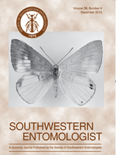
SOUTHWESTERN ENTOMOLOGIST
Pioneering Studies for Ecological and Agricultural ProgressSOUTHWESTERN ENTOMOLOGIST is a pivotal academic journal dedicated to advancing the fields of Agronomy, Ecology, and Insect Science. Published by the SOUTHWESTERN ENTOMOLOGICAL SOC in the United States, this journal plays a crucial role in disseminating vital research findings that address pressing ecological and agricultural challenges. With its ISSN 0147-1724 and E-ISSN 2162-2647, the journal has been publishing comprehensive studies since 1993 and continues to contribute significantly to the knowledge base up to 2024. As a Q4 ranked journal in both Agronomy and Crop Science and Ecology, as well as Insect Science, it provides an inclusive platform for researchers and students to share their insights and foster collaborations. Although it currently does not offer open access options, the content is accessible to academic institutions and professionals, ensuring that significant findings reach a broad audience. Given its niche focus, SOUTHWESTERN ENTOMOLOGIST not only appeals to researchers and students but also to professionals looking to stay updated on the latest trends and developments in entomology and its related fields.
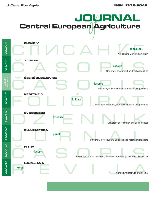
Journal of Central European Agriculture
Exploring Agricultural Frontiers for a Sustainable FutureThe Journal of Central European Agriculture, with ISSN 1332-9049 and E-ISSN 1332-9049, is an esteemed platform published by UNIV ZAGREB, FAC AGRICULTURE that caters to the dynamic fields of agronomy, crop science, and animal science. Since its establishment in 2000, this Open Access journal has played a crucial role in disseminating critical research findings while fostering collaboration among academics, researchers, and professionals within the agricultural community. The journal, which is based in the heart of Croatia, spans a rich history of scholarship, with its content available for free to readers and contributors alike. As reflected in its current standings, the journal has achieved a Quartile 3 ranking in Agronomy and Crop Science and Quartile 4 in Animal Science and Zoology for the year 2023, indicating its growing influence within these disciplines. With Scopus ranks placing it in the 32nd percentile among its peers, the Journal of Central European Agriculture is committed to advancing agricultural sciences not only in Central Europe but globally as it prepares for its converged years from 2007 through 2024. This journal serves as a vital resource for innovative research, practical applications, and a deeper understanding of agricultural challenges and solutions.
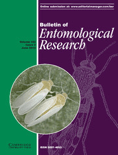
BULLETIN OF ENTOMOLOGICAL RESEARCH
Exploring the Intersections of Insects and InnovationBULLETIN OF ENTOMOLOGICAL RESEARCH, published by Cambridge University Press, is a prestigious journal that has been at the forefront of entomological research since its inception in 1910. With an impressive track record extending through to 2024, this journal serves as a vital platform for advancing knowledge in various related fields, notably Agronomy and Crop Science and Insect Science, where it ranks in the top quartile (Q2) and maintains a commendable position within the Scopus rankings in its categories. Notably, its contributions also intersect with Medicine in a broader scope, fostering interdisciplinary insights. While access to the journal content is not classified as 'Open Access,' its rigorous peer-reviewed articles are crucial for researchers, professionals, and students seeking to enhance their understanding of entomology and its applications in agronomy and beyond. The journal's impact is reflected in its notable percentile rankings, emphasizing its relevance and influence in the academic community. Located at the heart of the UK, the BULLETIN OF ENTOMOLOGICAL RESEARCH continues to be an essential resource for those dedicated to the study and understanding of insects and their impacts on agriculture and health.

ACS Agricultural Science & Technology
Empowering the Next Generation of Agricultural ScienceACS Agricultural Science & Technology, published by the American Chemical Society, is an influential journal dedicated to the advancement of agricultural research and technologies. Since its convergence in 2021 and continuous publication until 2024, the journal has established itself in the fields of Agricultural and Biological Sciences, Agronomy and Crop Science, Food Science, and Plant Science, having achieved a commendable Q2 ranking across these categories in 2023. This signifies its growing impact and relevance within the global research community, evidenced by its Scopus rankings, which place it in the top percentiles of its fields. Although currently not an open-access journal, it provides a critical platform for disseminating pioneering research that addresses pressing agricultural challenges, fostering innovation in crop production, food security, and sustainable practices. As such, it serves as an essential resource for researchers, professionals, and students aiming to contribute to the future of agricultural science.
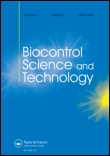
BIOCONTROL SCIENCE AND TECHNOLOGY
Empowering Research for Effective Pest ManagementBIOCONTROL SCIENCE AND TECHNOLOGY is a premier, peer-reviewed journal published by Taylor & Francis Ltd that specializes in the dynamic fields of Agronomy and Insect Science. Established in 1991, this journal has garnered a reputation for disseminating high-quality, impactful research with an impressive 2023 Scopus rank of 53 out of 181 in Insect Science and 153 out of 406 in Agronomy, placing it in the Q2 category for both fields. With its ISSN 0958-3157 and E-ISSN 1360-0478, the journal serves as a vital resource for researchers, professionals, and students dedicated to advancing understanding and innovation in pest management and biocontrol strategies. Although not an open-access journal, it offers comprehensive insights that are crucial for professionals aiming to tackle agricultural challenges and enhance food security. The journal’s continuous coverage from 1991 to 2024 ensures that it remains at the forefront of significant advancements in biocontrol, making it an essential read for anyone interested in sustainable agricultural practices and integrated pest management.
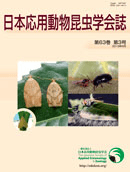
JAPANESE JOURNAL OF APPLIED ENTOMOLOGY AND ZOOLOGY
Bridging Academia and Industry for Ecological InsightsJapanese Journal of Applied Entomology and Zoology is a premier publication in the field of Insect Science, offering a platform for researchers and practitioners to share their findings on applied entomology and zoology. Established in 1957 and published by the Japan Society of Applied Entomology and Zoology, this journal aims to foster the understanding of insect-related studies that impact agriculture, ecology, and biodiversity. With an ISSN of 0021-4914 and E-ISSN of 1347-6068, it serves as a crucial resource for both academics and industry professionals. While the journal currently resides in the Q4 category of the Scopus ranking for Insect Science with a percentile of 11th, it plays a significant role in providing valuable insights into insect behavior, systematics, and their ecological roles. Readers can benefit from its published research to drive innovations and solutions in pest management and conservation practices. As the journal continues to evolve, it reinforces its commitment to disseminating critical research that supports sustainable practices in entomology and zoology through its convergence extending to the year 2024.
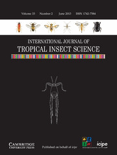
INTERNATIONAL JOURNAL OF TROPICAL INSECT SCIENCE
Innovating Research in Insect Ecology and BehaviorINTERNATIONAL JOURNAL OF TROPICAL INSECT SCIENCE, published by Springer International Publishing AG, is a leading interdisciplinary journal dedicated to advancing knowledge in the fields of insect science and ecology. With its ISSN 1742-7584 and E-ISSN 1742-7592, this journal provides a platform for researchers to publish high-quality, peer-reviewed articles that explore various aspects of tropical insect biology, behavior, and their ecological impacts. As evidenced by its Q3 ranking in both Ecology, Evolution, Behavior and Systematics and Insect Science, it plays a vital role in fostering scientific dialogue and innovation within these disciplines. Researchers affiliated with the journal benefit from its visibility and growing impact, as demonstrated by its Scopus ranks, with a percentile standing of 61st in Insect Science. Although the journal is not open access, it still reaches a wide academic audience, making significant contributions to our understanding of tropical ecosystems. Situated in Switzerland, this journal is crucial for students, professionals, and researchers invested in the intersection of entomology and ecological science.

PEST MANAGEMENT SCIENCE
Innovating Practices for Ecological ResiliencePEST MANAGEMENT SCIENCE, published by John Wiley & Sons Ltd, stands as a leading journal in the realms of agronomy, crop science, and insect science. With an impressive Q1 ranking in these disciplines, as well as in miscellaneous medicine, this journal boasts a commendable influence within the academic community, reflected by its position within the top percentiles of Scopus rankings—ranked #7 out of 181 in Insect Science and #43 out of 406 in Agronomy and Crop Science. Covering a broad spectrum of pest management strategies and methodologies, it serves as an essential resource for researchers and professionals aiming to advance their knowledge and practices in sustainable agriculture and pest control. The journal’s commitment to open access ensures that cutting-edge research is widely disseminated, contributing significantly to global agricultural productivity and ecological sustainability. With coverage extending from 2000 to 2024, PEST MANAGEMENT SCIENCE remains pivotal in shaping the future of pest management.

Egyptian Journal of Biological Pest Control
Championing open-access research for a pest-free future.The Egyptian Journal of Biological Pest Control, published by SPRINGER, is a premier open-access journal dedicated to advancing the field of biological pest management. With its ISSN 1110-1768 and E-ISSN 2536-9342, this journal has established a reputation for disseminating high-quality research since its inception in 2008. Its commitment to open access since 2018 enhances its accessibility, making vital research available to a global audience. The journal boasts impressive Scopus rankings, including a Q1 classification in Agronomy and Crop Science and Insect Science for 2023, demonstrating its significant influence in the realms of ecological and agricultural research. The journal serves as an essential platform for researchers, professionals, and students interested in sustainable pest control strategies, focusing on the integration of biological methods within conventional agricultural practices. Based in Egypt, it plays a crucial role in addressing both regional and global challenges in pest management, affirming its importance in the scientific community.
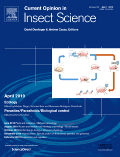
Current Opinion in Insect Science
Transforming Perspectives in Insect ScienceCurrent Opinion in Insect Science is a leading academic journal published by ELSEVIER, dedicated to advancing understanding in the field of insect science. With an impressive impact factor reflected in its top quartile rankings (Q1) within both Ecology, Evolution, Behavior and Systematics and Insect Science, the journal holds a prominent position, ranking 3rd out of 181 journals in Insect Science and 35th out of 721 in Ecology-related fields according to Scopus for 2023. Since its inception in 2014, the journal has provided a dynamic platform for researchers, professionals, and students to explore and share cutting-edge developments and insights, targeting crucial topics in insect biology, ecology, and systematics. Although there are no open access options available, Current Opinion in Insect Science remains an essential resource for those looking to stay at the forefront of their research or academic interests.